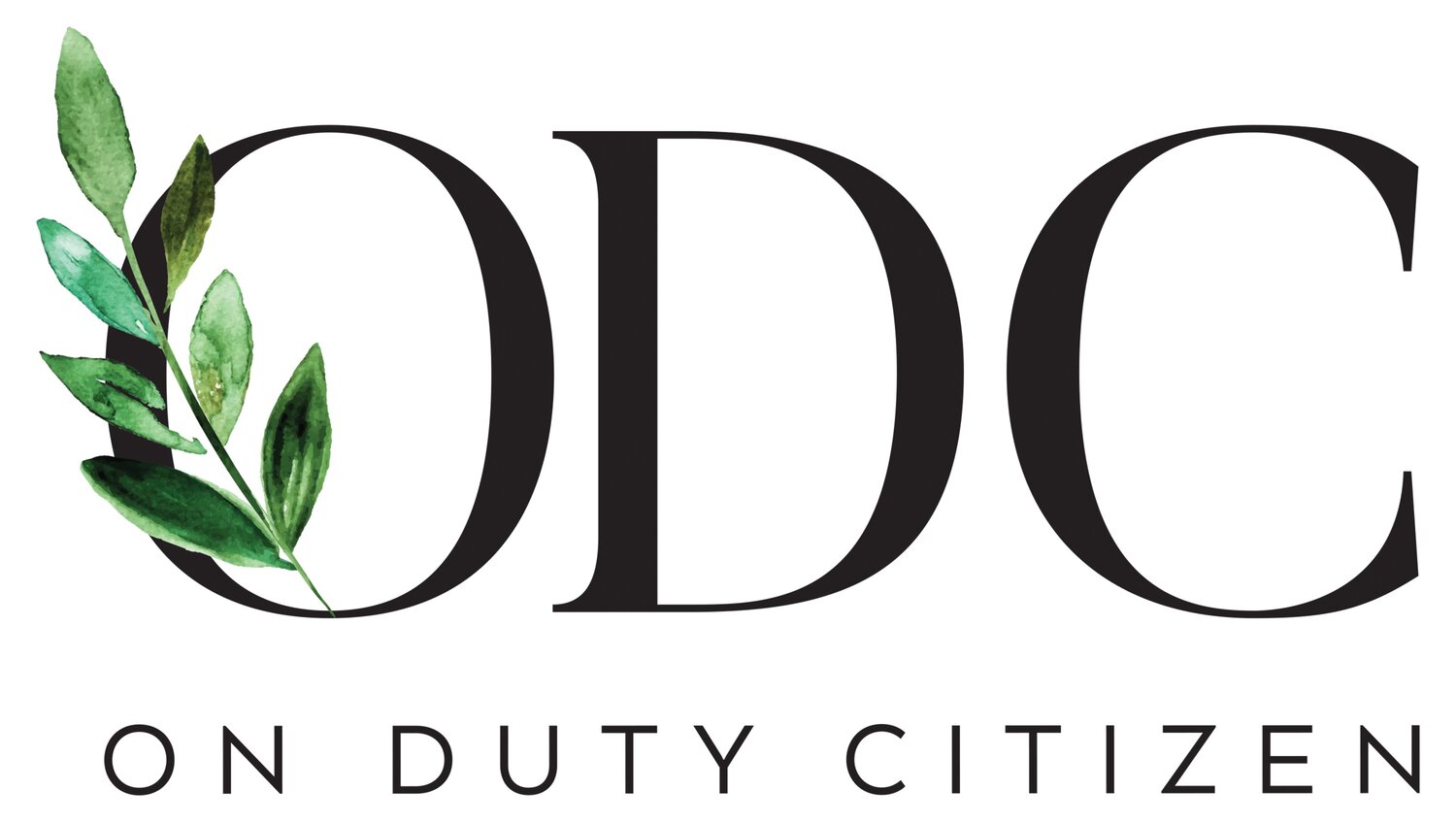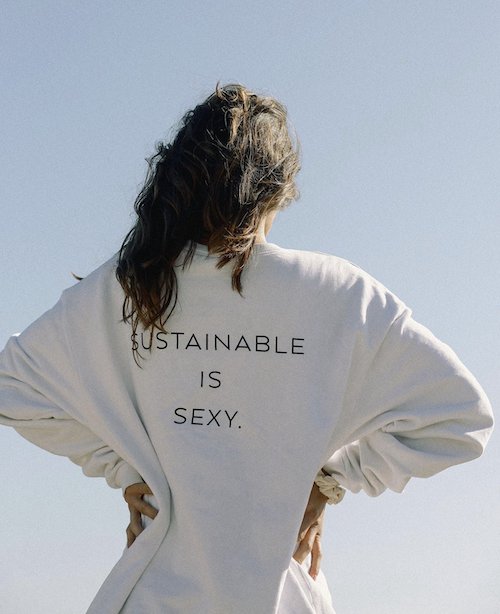ON DUTY CITIZEN
ARTI JALAN
1) I really enjoyed hearing about your background and upbringing into the sustainable world on the Finding Your Wave podcast. Can you briefly introduce yourself to our ODC community and share where you are currently based?
I’m Arti, and I’m the founder of Forage and Sustain, which is a platform dedicated to sustainable and conscious living. Through a very active IG and newsletter community, informative blog posts, in-person workshops, a curated online marketplace, and my newest release - Conscious Consulting for small businesses, Forage aims to guide us along in our quest for a more conscious, sustainable and kind world. I’m based in Toronto, Canada.
2) I love hearing about the moment people realized they were passionate about environmentalism. What was this moment like for you?
I don’t think I had a definitive moment of realization, but rather a slow build up to it. My experiences living in different countries that prioritize slow living, working for startups/artisanal companies that placed an emphasis on traditional craftsmanship, and being a child of Indian parents who intrinsically practiced conscious living were all contributors that led me to this space.
3) Are you optimistic about the future of sustainability and regeneration? If so, how do you find balance and remain positive when you come across disheartening news?
My feelings about the future definitely ebb and flow, and maintaining balance and perspective is so important in not succumbing to eco anxiety. As much as there is a lot of disheartening news that we’re exposed to daily (and which can feel very heavy at times), there are also a ton of uplifting and inspiring stories about sustainability that we can put faith in. From when I started this journey in 2017 to now, the conversations around sustainability have erupted, with it having gone from a concept to a true movement, and that gives me great optimism for the future. To remain positive, I try not to listen to the mainstream media too much, and really focus on what I can control, and then emit from that frequency.
4) I love that you are open with your community about your platform values, from transparency and kindness, to artistry and reciprocity! Can you tell us a bit about each of these key points and why they are so integral to your vision?
For sure! These key points (along with the others), are important foundational bricks to my entire ethos with Forage, and largely, my life as well.
Transparency has always been something I look for when determining which sustainable brands to partner with (or buy from), as the level of their openness with their audience is a key defining factor of their standards, ethics, and true impact. The sustainability industry is thick with greenwashing, so it’s important to me to not only partner with transparent brands, but to exercise the same honesty with my own audience.
Kindness is another key pillar of Forage, as I believe that when we show up with kindness, we allow room for error, imperfection, and raw humanism. In a world where cancel culture is becoming alarmingly accepted, extending kindness outwards helps us thrive as a collective, which in turn helps us evolve and progress in more inclusive and meaningful ways.
I believe that art and beauty are fundamental to how we perceive the world, and quite simply, bring us joy and a sense of calm. In a world with too much noise, overstimulation and jarring imagery, the infusion of artistry into our everyday serves as a function of refuge, whilst encouraging beautiful, slow living.
Reciprocity is the basis of a circular system, where we are mindful of the exchange that occurs between all living things and plant matter. By encouraging a cyclical response to consumption, we ensure we’re giving back, and not just taking. Additionally, I believe that reciprocity doesn’t just relate to physical consumption of resources, but also to action. When we take from marginalized cultures, traditional practices and Indigenous learnings, we must ensure we honour, credit, uplift and amplify those that came before us, for a truly reciprocal exchange.
5) I personally struggle between supporting a company who is at least trying to do better versus calling some out for not doing enough. Sometimes it’s a thin line… How do you separate “earth crusaders” from green-washers?
It’s definitely a thin line, and the industry is thick with it! My default is to support small businesses as much as possible. In any industry, the damage done by massive corporations is always far greater than any a small business would have the resources to do, so when in doubt, shop small!
Some things to keep in mind when separating the two include:
Checking a brand’s claims – if they say they’re sustainable but you can’t find any real information on their website, it’s a red flag. Look into their fabrics, their workers, their processes, their packaging, their pricing (there’s just no way a $5 tee could ever be sustainable).
Check for transparency – are they showing you their factories and workers? A breakdown of ingredients? The people behind the company? If they’re not open about their ethics and story, it might be a red flag.
Do they use vague buzzwords like “natural” “sustainable” “green” or are they actually taking you through their process? A brand that is truly sustainable will have nothing to hide, and will in fact be overzealous to share their sustainability practices.
Keep in mind though that cancel culture can cause self-silencing, meaning many brands aren’t open for fear of getting called out because they’re not doing enough. Instead of canceling or calling them out, try dropping them a kind email/DM to learn more - this is an approach that helps keep you informed, while also letting them know that their customers are interested in sustainability. With that being said though, there are many brands who are greenwashing us and falsely misleading their audience in order to be relevant and marketable. If that’s the case, feel free to get in touch with them as well and let them know transparency is important to you, and that their false claims are not okay. And then boycott if necessary. You have the power to choose, so making informed decisions just takes a little patience and research!
6) I love all the guides you have on your website. Ones that struck me were your guides to Black and Asian-Owned businesses. Can you share some of your favorite Black and Asian-owned brands with us as well as how you think we can make the sustainable movement more inclusive and accessible?
Some of my favourite Black-owned businesses are: Eu’genia Shea, Apprenti Ôr’ganik, and Tree Fairfax
Some of my favourite Asian-owned businesses are: Meow Meow Tweet, Paper Project, Mala the Brand (use code FORAGE10 for 10% off!), and Apothékary (use code FORAGEANDSUSTAIN for 20% off).
This is a huge topic! But in a nutshell, to make it more inclusive and accessible, quite simply, we need to be more inclusive and accessible.
Uplift and amplify BIPOC voices in the sustainability space (it’s currently dominated by a very specific demographic, despite the fact that BIPOC are and have been, natural stewards of the land for generations).
Take a look at how you might be perpetuating implicit biases, and adjust accordingly.
Follow BIPOC creators in the sustainability space who can help provide the education and direction you need to shift perspectives.
For brands, retailers and those with public platforms:
Invite folx in and diversify – everything from your models to your management teams to the people you choose to partner with & feature
Consider a range of sizes that extend beyond XS-XL, and make adjustments for differently-abled folk and diverse body types
Really think about your colour releases and how they might change based on skin tone, instead of using white skin as the default.
If you stock products from brands, think about how much shelf space you’re giving to BIPOC – is there a discrepancy? How can you change that?
These are just some examples, but overall, when we expand our thinking to include all voices and perspectives, we make room for a kinder, more inclusive world.
7) What are some tips you have for people looking to implement conscious habits into their daily routine?
I say this all the time, but my long-standing advice is to start small! It can be very overwhelming to try and tackle this all at once, so go step-by-step. Make a list (it can be by room in your house, or by products you use the most), and start to switch each one out for a more earth-friendly option.
Some examples include:
Switching out your tampons & pads for period underwear or a silicone cup
Declining plastic bags at the grocery store, and bringing your own mesh produce bags and reusable totes
Re-purposing an old cotton t-shirt into a cleaning rag, instead of buying a new one
Once you start, it becomes so much easier, and you’ll start to take notice of all the wasteful items you might have been unconsciously using, as well as how you can re-use what you already have.
Also, remember that sustainability isn’t just about plastic and waste. Considering ethics, inclusivity, and cultural sensitivity is just as important, and asking yourself questions before purchasing is how you can begin to weave consciousness in.
Ask:
Who made my clothes - if a tee is $7 at H&M, how much did the person making it earn?
Who owns this brand - am I ensuring that I’m supporting a diverse range of small businesses?
Are all the brands I shop from white-owned?)
Does this product or practice tread on cultural appropriation? What benefit am I looking for and how can I find it in a way that doesn’t encroach on marginalized folk?
8) What are some of your favorite resources you use to learn more about sustainability, conscious living, or environmentalism?
There are so many, but two of my favourites are The Slow Factory and Emergence Magazine!
9) Thank you for leading such an inspiring platform. I’m thankful to be surrounded by individuals like yourself who motivate me endlessly. What (or who) are you inspired by?
Thank YOU for creating this beautiful space! I’m an avid reader and I always find that good fiction has a way of inspiring me deeply. Other inspirational sources include the natural world around me, art, travel, and documentaries about food! All of these sources have a common thread – storytelling, which is a way that I learn and absorb best.
Follow Arti along on social media: @forageandsustain




